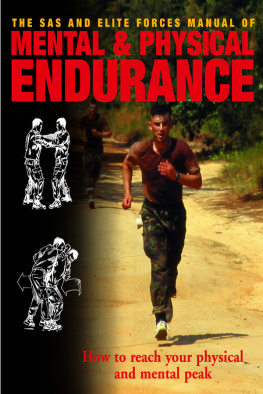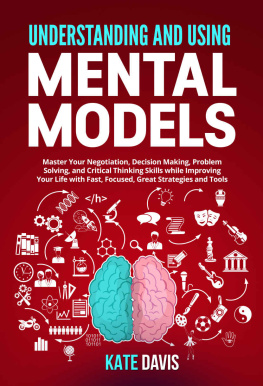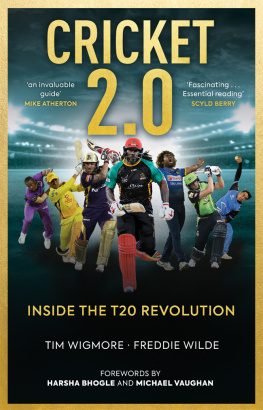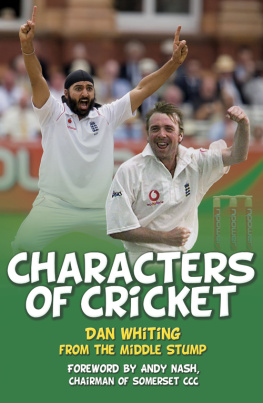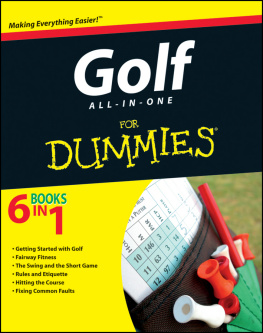For Zara
PROLOGUE
I n sport, and life, we experience heartache and glory, elation and despair and a million and one other feelings, chemical reactions and emotions in between.
The challenge is how we deal with them. Do we travel a path of acceptance or do we open our eyes to what is really happening? Do we really take the chance to act, question and analyse?
I have always, possibly to the exasperation of others, been one to question accepted ways of going about our daily business. That could be on a cricket pitch, in a changing room, or in everyday life. I cant help it. Its as if Im hardwired to challenge received wisdom.
Its one of the reasons I went into coaching, creating a centre of excellence. Perfection may be impossible, but excellence most certainly isnt. I wanted to build within those four walls individuals, not simply cricketers, equipped to deal with what life, in everyday or match form, delivered them.
They say cricket is a game played between the ears, and its true. But so is existence. Understanding ourselves is vital. We can harden muscles, make ourselves fitter than others, but if we do not apply similar vigour and attention to our minds then we are not moving forward. When Usain Bolt won the Olympic 100m at Beijing, London and Rio, he didnt leave his brain in the blocks.
As a sportsman, I was sure to use a keen and inquisitive mind to improve myself, be that questioning kit, training, tactics or technique. Twenty years later, I saw British Cycling refer to the same ethos as marginal gains. Call it what you want, but mental awareness of yourself and your environment is everything.
When the whites were off, I was, it would transpire, a little less well equipped to deal with the mental requirements of, well, being me. I thought my baggage started and ended with the coffin of cricket equipment I dragged around the globe. In fact, that was actually feather-light compared to the burden I was carrying in my head. One of the results was a depression of almost paralysing violence. And yet I have come to see that, actually, those self-same techniques I was using as a sportsman could have been transferred to real life. Im not saying what happened wouldnt have done. But I feel certain that better understanding of ourselves, in the context of past experiences, and our everyday lives, is a clear route to a better self.
I am not setting myself up as a guru of the mind. A man who used to climb hotels for fun is in no position to do so. But I do believe that I can pass on some helpful ideas and information. No need to pad up. I believe, while seen through the prism of a sportsman, those ideas are equally applicable to the workplace, relationships and that vast immeasurable thing called life.
If there is one mental change I hope I can make to every reader, it is this: I hope Mind Over Batter will help you enjoy yourself just a little more.
INTRODUCTION
I m sitting on a train, listening to some music. Nothing new there its the kind of thing I do all the time. Except this moment is different. Right now, I am overcome by emotion. I want to cry. Here, on this jam-packed express from London to Durham, I want to cry. My eyes are starting to water. Fortunately, Im in a window seat, so I turn and stare out across the rushing countryside. This deep flood of feeling has taken me by surprise and I am trying to suppress it. But its overwhelming and I start to think, No, no, just let it go. Just feel this way. Let it happen. Twenty minutes later, as we pull into York, it has gone. Im not confused. Not disturbed. I know exactly what has happened. Ive taken the top off the bottle and let all the fizz come out.
I was anxious as anything when I arrived in London that day. It was 31 degrees in the capital, but the sweat wasnt pouring out of me because it was hot. As someone who suffers from anxiety and panic attacks, I know how it feels to be sucked into a mental whirlpool and the symptoms that accompany that desperate journey. And yet this was different. While I was nervous and uncomfortable, hence the sweating, I knew Id made the correct choice. Id done the right thing in waiting this long. I wouldnt have been able to handle it earlier in my life.
I had no trepidation then about walking up to the door of a lovely old stone building in north London. I went in and was directed to a small sitting room. I was there for five minutes, possibly until Id stopped sweating so much and wasnt as flustered, before being taken into a beautiful room with wooden bookshelves, an old-fashioned desk, leather swivel chair, couch, and another chair in which I sat myself down. He stared at me. I stared back. Theres no point spending an hour-and-a-half like this, is there? I thought.
I suppose you want me to start, do you?
Whenever you want.
I explained that I hoped, finally, to find out what was in my head, and there was only one person I could possibly comprehend carrying out the task.
Why me? he asked.
Why you? Because you obviously understand cricket. Ive always got on with you. As a young player, I always enjoyed chatting and having a drink with you. To me there was nobody else. I would not sit down with anybody else but you.
He said he was flattered and understood where I was coming from.
Id put my trust in this person, a decision which hadnt come lightly. Id done a lot of mental health work before and since my previous book, Absolutely Foxed , came out. Id spoken openly about my issues of anxiety and depression, and how, at my lowest point, I no longer wished to be alive. I was aware that I wasnt alone in experiencing such inner turmoil before I wrote that book, and even more so afterwards. And yet, unlike so many others Id encountered, I had never allowed myself to be analysed. Put simply, I feared what a psychologist might find. To me, letting loose whats in my head would be like pulling the string on a party popper. Once all that stuff was out, thered be no way of getting it back in again, and that scared me. But now I was 61, and it seemed there was much more to gain than lose. It would be good, cathartic perhaps, to understand what makes me, well, me. Why am I like I am? The motivations. The aspirations. The irritations. The combativeness. The competitiveness. The man who feels separate as much as he feels he belongs.
To understand oneself, and others, mentally is one of the greatest breakthroughs we can ever achieve. And yet only in the last 10 or 15 years has this become a serious discussion, be it on the sports pitch, the factory floor, or wherever. How can we ever operate to our true potential without the knowledge of what is happening within? And how do we use that knowledge to better ourselves and others? Cricket, my chosen field, is often spoken of as a game played in the head. And yet it seems the conversation stopped there. Incredibly, until recently, no one questioned that statement any further. In the 24-hour clock of cricket, and sport as a whole, it has taken until the stroke of midnight for anyone to wake up to the essential role played by the mind. Its akin to Henry Ford inventing the Model T in 1908 and only now fitting the steering wheel.
Mind Over Batter allows me to reveal my views on why we can never overestimate the mental side of cricket, and, indeed, life. As someone whose most intense highs have been mirrored by equally devastating lows, I, like millions of others, have learned about mental health the hard way. But I knew right from the start, back when I was in short trousers, that how I dealt mentally with challenges, opportunities and setbacks would dictate my life. I became known as a boy and man who displayed a talent with a bat. What people didnt realise was that my success came just as much from between my ears. I understood, sometimes instinctively, sometimes over time, that strength isnt solely about muscle, its about having the mental tools to deal with any given situation. I was by no means a master of the art unlike the man sat before me in this book-lined room in London but the knowledge I had certainly helped me make the most of myself, and, when I went into coaching, helped those of the next generation, many of whom have enjoyed long and fruitful careers in Test and first-class cricket. They were an elite, but the same principles apply at every level, from the men and women playing for their clubs to the schoolkids nattering away on the minibus to an away game.


